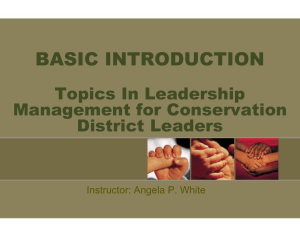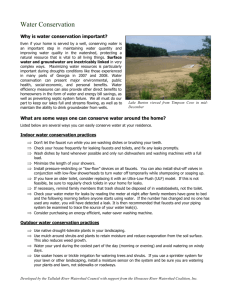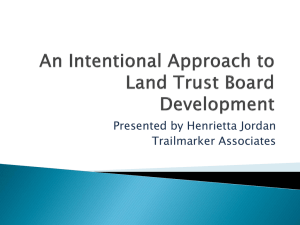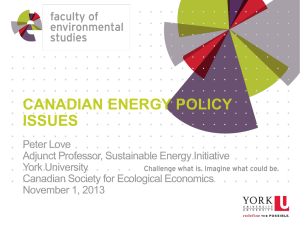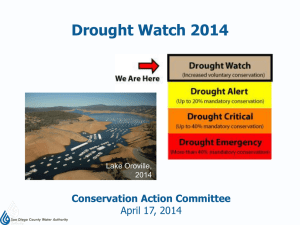Statutory Framework for Water Authority
advertisement
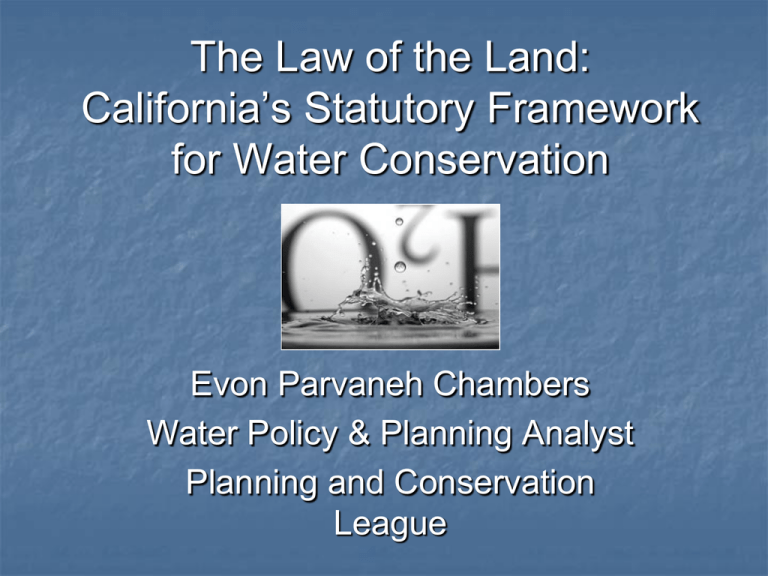
The Law of the Land: California’s Statutory Framework for Water Conservation Evon Parvaneh Chambers Water Policy & Planning Analyst Planning and Conservation League Developing the West The story, set in Los Angeles in 1937,was inspired by the historical disputes over land and water rights that had raged in southern California during the 1910s and 20s, in which William Mulholland acted on behalf of Los Angeles interests to secure water rights in the Owens Valley. A century later similar issues still persist in California. The Sacramento San Joaquin Delta • Endangered Species Act • 2009 Water Package • Delta Flow Criteria Colorado River Aqueduct Drought Climate Change DWR, Climate Change Report Decline of snowpack Increased variability of rainfall Sea level rise Increased frequency of droughts, floods, and large scale fires Legislative Response: Our existing policies Show Me the Water Bills SB 221 & SB 610 (2001) Water Meters AB 2572 (2004) & AB 1975 (2010) 20X2020 SBX7 7 (2009) Water Demand Management Grants & Loans AB 1420 (2007) Show Me the Water Legislation requires approval of large new developments (500 units or more) be linked to assurances that there is an adequate water supply. Prior to the legislation, large projects could be approved without a demonstrated water supply. Water meters AB 2572 requires all water suppliers to install water meters on all customer connections by January 1, 2025 AB 1975 requires all new multi-unit housing have water meters 20 X 2020: Water Conservation Plan Senate Bill X7 7 requires all water suppliers to increase water use efficiency by: Setting the state goal of reducing per capita urban water use by 20% by December 31, 2020. Setting the intermediate state goal to reduce per capita water use by at least 10% by December 31, 2015 Water Demand Management Grants and Loans AB 1420 requires water management grants or loans be conditioned on implementation of the 14 Best Management Practices (BMPs) listed and described in the California Urban Water Conservation Council (CUWCC) Memorandum of Understanding (MOU) Current Framework Prove you have the water Meters to track water use State program to reduce per capita use Incentives from the state to fund water demand reduction programs What’s next in the regulatory pipeline? Developing with no “new” water What do you do when you live in a water strapped area that wants to develop? During the last 2 legislative sessions 3 bills were introduced trying to tackle this issue. Each bill tried to used the water supply verification as an incentive to developers to reduce on-site water demand and invest in a local water mitigation fund None of the bills passed. We found a one size fits all approach would not work. Water Neutral Development Lesson learned: A statewide policy was not the right approach. Regional/ local approach works better than an overarching state policy. Working with local groups to design a local option to accommodate growth while creating sustainable local jobs Housing Crash & Drought Dept. of Water Resources, Recent California Drought Total Housing Starts Rise for Fourth Straight Month in August, CBIA Announces However, single-family sector continues to struggle Can Water Neutral Developments assist in revitalization of the single family housing sector? Questions for Discussion What can LAFCO commissioners do in respect to Water Conservation? Can LAFCOs condition the approval of an annexation on the development being water neutral or water smart? For more information please contact: Evon Parvaneh Chambers Water Policy & Planning Analyst Planning and Conservation League E-mail - echambers@pcl.org Phone – (916) 313-4518


